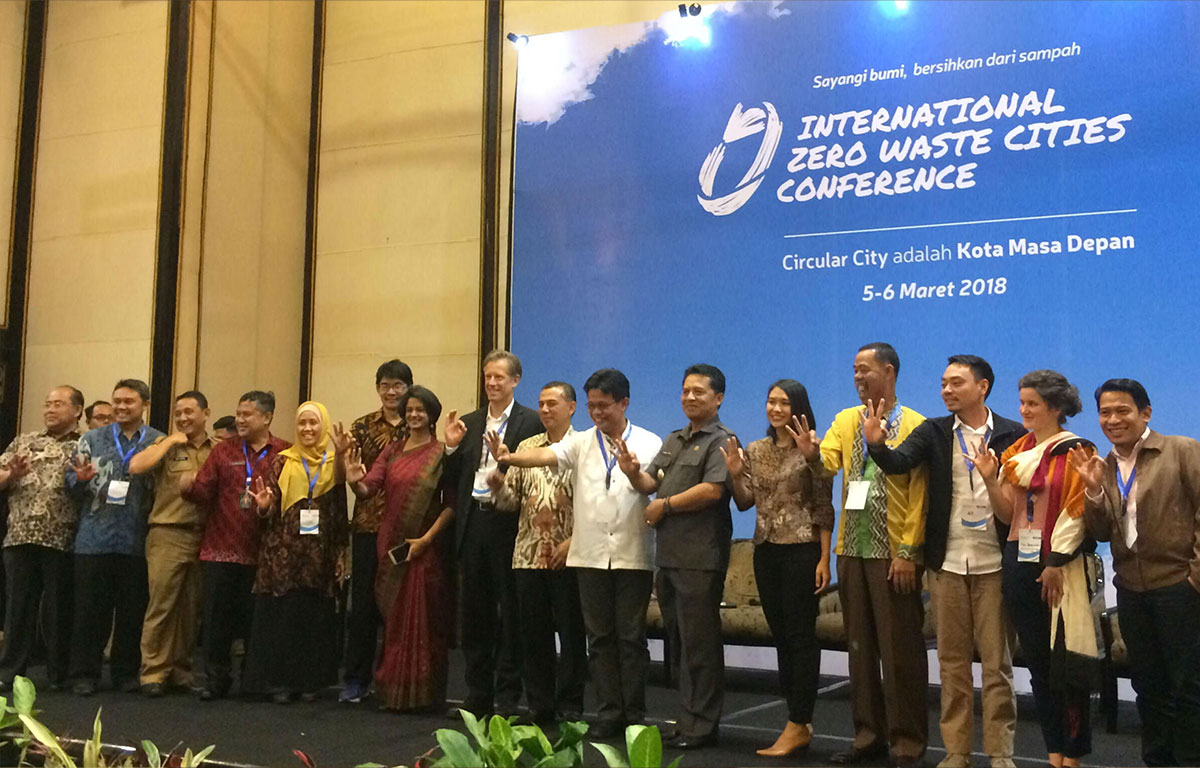BANDUNG, Indonesia (March 19, 2018) — Going Zero Waste is the way to go for cities. This has been the conclusion of experts and practitioners in the recently held International Zero Waste Cities Conference in Bandung, Indonesia.
With the theme, “Breaking A ‘Linear’ City: Adopting Zero Waste Towards a Circular Economy,” the event gathered experts, local government leaders, and practitioners from key cities in Asia to discuss, learn, and share experiences in implementing Zero Waste programs.
During the opening plenary, Flore Berlingen of Zero Waste France highlighted the importance for local governments to invest in Zero Waste programs in order to achieve circular economy.
“In Europe, it is the municipalities, not the nations, that are leading the way to Zero Waste. Several hundreds of communities and cities in the EU have committed to Zero Waste and so they are moving very fast,” she said.
Zero Waste is a people-centered solution to the issue of waste. It is an approach to the use of our resources which ensures resource efficiency, resource recovery, and protection of scarce natural resources.
Berlingen also argued that incineration — or burning of waste — is not part of the solution to cities’ waste problems. “Incineration does not solve the problem of waste. We believe that the solution is moving towards circular economy—making our resources last longer,” she added.
Jack Macy of SF Environment, City of San Francisco, USA, echoed the need for local governments to invest in Zero Waste, citing examples from his city.
“Why do we have to go Zero Waste? Linear system is unsustainable; we need to move past beyond that. San Francisco has made a policy about Zero Waste. We need Zero Waste to manage waste on the landfill, to remove incineration, to promote the best use of waste management, and to increase the responsibility of consumers and producers,” Macy said.
Likewise, local government leaders from the Global South like the Philippines also shared their experiences in implementing Zero Waste policies. Benedict Jasper Lagman, a city council member of the the City of San Fernando in Pampanga, Philippines, shared the experiences of his city in achieving a plastic bag ban. The city has been hailed as a model city in implementing Zero Waste programs.
“We did baby steps to apply the policy on plastic bag ban. We educated people on radio and TV. We started with Plastic-Free Friday. Since 2015, we have totally banned the use of plastic bags. By now, 85% of the citizen are obeying the rules. Now we are aiming for plastic straw ban,” Lagman shared.
Currently, GAIA Asia Pacific member organizations BaliFokus Foundation, Citizen consumer and civic Action Group, EcoWaste Coalition Philippines, Consumers Association of Penang, Health Care Without Harm Asia, Mother Earth Foundation, Yayasan Pengembangan Biosains dan Bioteknologi (YPBB), Stree Mukti Sanghatana (SMS), War on Waste Negros Oriental (WoW Negros Oriental), and Thanal are implementing Zero Waste programs in key cities in the Philippines, India, Indonesia, and Malaysia. The Plastic Solutions Fund (PSF) is currently supporting this collaboration project - Building and Supporting Zero Waste Cities: Developing Asia Pacific Models for Leading with Solutions at the Frontlines of the Plastics Pollution Crisis - aimed at implementing Zero Waste practices in 16 cities; amplifying positive stories about Asian communities and activists involved in solutions-based organizing; and recognizing Zero Waste champions among partner city officials and waste workers. PSF is an international funders’ collaborative that aims to turn the tide on plastic pollution in our oceans, rivers, land, and air. The Fund promotes innovative collaboration among individuals and institutions, support results-oriented grant making, and provide a trusted platform for new philanthropic investment in order to prevent plastic pollution.




